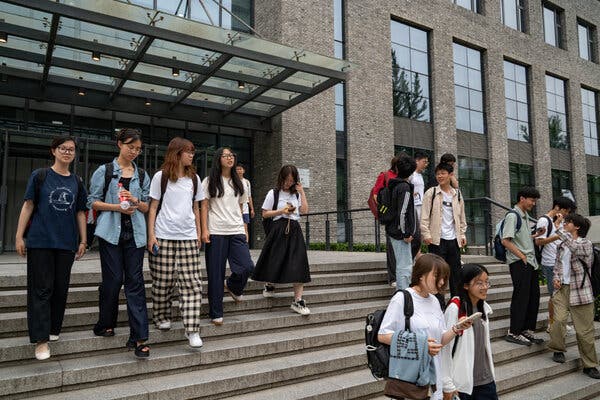
The Chinese government recently introduced a new visa aimed at attracting young scientists and technology experts from abroad, positioning it as a significant move towards establishing China as a leading scientific power. Set to take effect on October 1, the initiative has sparked considerable controversy among the Chinese public, with many expressing concerns that foreign talent could take jobs away from local workers.
Responses to the visa announcement have been overwhelmingly critical, particularly in the days surrounding its launch. Many commentators accused the government of inviting foreigners to “steal” job opportunities from young Chinese, who are already facing an increasingly challenging job market. Nationalistic sentiments have surfaced, with some social media users decrying the idea of welcoming foreigners, labeling it as misplaced admiration and a betrayal of national interests.
The backlash intensified after Henry Huiyao Wang, president of the Center for China and Globalization, publicly endorsed the visa program. This led to a wave of derogatory comments directed at him online, branding him a “race traitor.” Social media platforms became inundated with negative remarks, particularly targeting individuals from India, especially after Indian media suggested the Chinese visa could serve as an alternative to the popular H1-B visa in the United States.
In response to the growing discontent, the People’s Daily, the official newspaper of the Chinese Communist Party, published an editorial defending the visa. The publication labeled criticisms as “outlandish” and accused detractors of misleading the public. In a video, Hu Xijin, former editor-in-chief of the nationalist tabloid Global Times, supported the initiative, arguing that China currently does not have an excessive number of foreign nationals. He remarked, “To be honest, it’s not that there are too many foreigners coming to China right now, but rather that there aren’t enough.”
Despite the government’s efforts to promote the visa, public sentiment indicates that attracting top global scientists may still prove difficult for China. This is especially relevant as the United States has reduced research funding, prompting some prominent scholars to consider relocating. Over recent years, anti-foreign sentiment has been on the rise in China, with the government warning against perceived hostile foreign influences and urging citizens to report potential spies.
Historically, China has maintained low levels of inbound immigration, and various cultural and legal barriers persist for foreigners seeking long-term residency. In 2020, the government aimed to slightly relax permanent residency requirements but ultimately reversed course following similar public backlash. Between 2004 and 2014, China granted fewer than 5,000 permanent residency cards, according to data from the People’s Daily.
While the government has indicated that the new visa would simplify the process for young scientists to enter China, it has emphasized that this should not be equated with immigration. Uncertainties remain about the visa’s provisions; it is unclear whether it would allow recipients to work or merely facilitate educational and business exchanges. Details regarding eligibility criteria have not been disclosed, despite the passing of the launch date. Officials have only mentioned that applicants should hold a bachelor’s degree in science, technology, engineering, or mathematics from a recognized institution.
The job market for young people in China has been under strain for several years, exacerbated by the country’s slowing economic growth. Recent employment statistics released in August indicate that youth unemployment has reached a new high. A popular manga author, using the pen name Feng Xi Shen Lei, shared on social media, “Among people from every walk of life, educational background, and age group I’ve met, everyone says: Work is hard to find.” Many young Chinese feel that advanced degrees are necessary to secure employment due to stiff competition.
The mismatch between the job market supply and demand complicates the situation further. Many recent graduates are struggling to find work as traditional sectors, such as real estate and education, are experiencing downturns. Conversely, fields like advanced manufacturing and artificial intelligence are in desperate need of qualified individuals. According to the Ministry of Education, China requires millions more candidates in these sectors.
Denis Simon, former executive vice chancellor of Duke Kunshan University and a proponent of increased scientific collaboration between the United States and China, believes that greater transparency regarding the visa process could alleviate public concerns. He noted that the Chinese government is signaling a clear intention to attract more foreign expertise as part of ongoing reforms aimed at securing high-end talent for the country.
As China navigates the complexities of its labor market and international relations, the reception of this new visa program highlights the challenges it faces in balancing domestic priorities with its ambitions on the global scientific stage.







